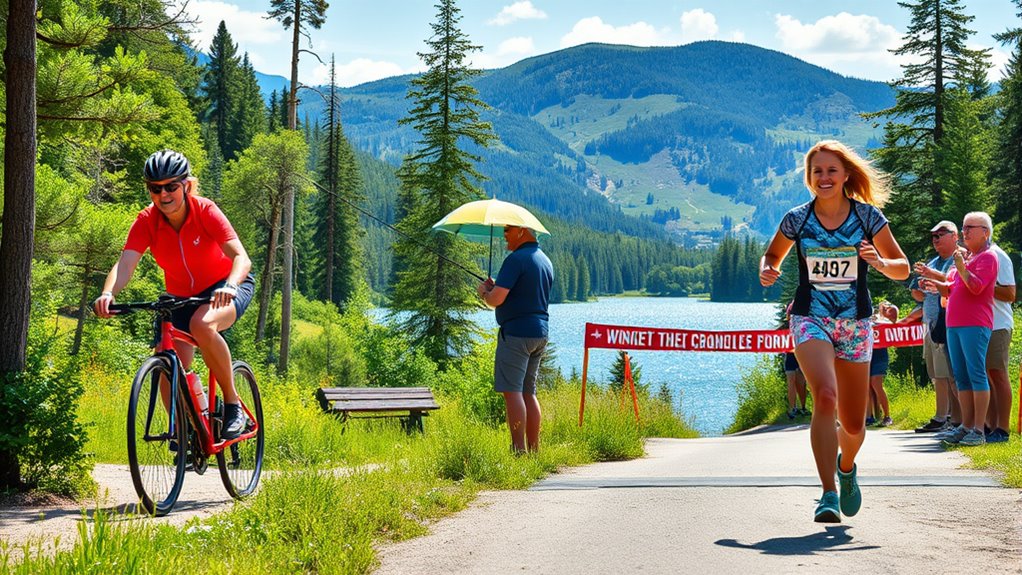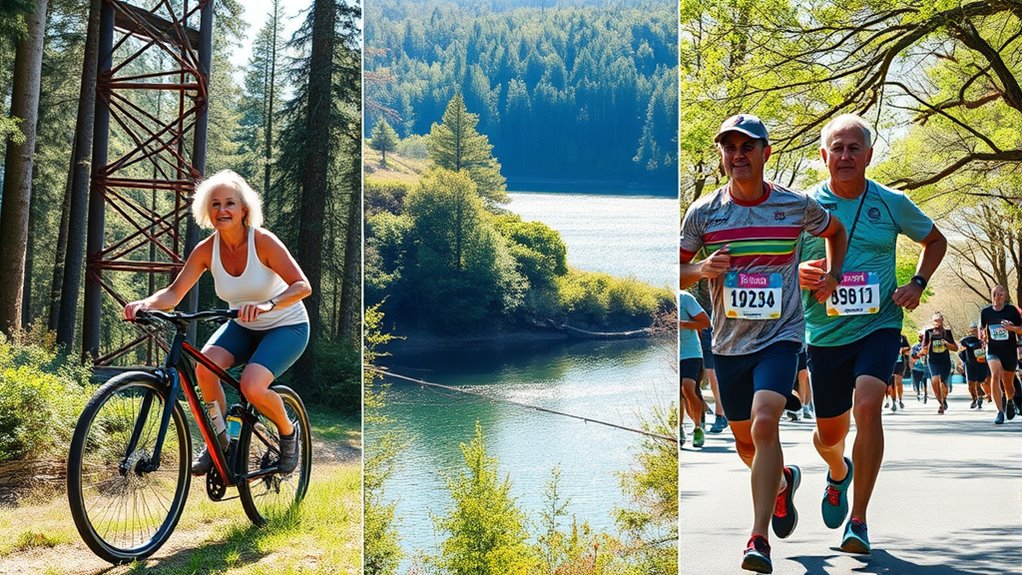At 60+, outdoor adventures like cycling, fishing, and marathons can boost your health and keep your spirit lively. With proper planning, safety gear, and awareness of weather and terrain, you can enjoy these activities safely. Take time to prepare, listen to your body, and respect outdoor limits. Keep your adventures safe and fun, while discovering exciting new ways to stay active—more tips to guarantee your outdoor experiences are both enjoyable and rewarding await you.
Key Takeaways
- Prioritize safety with proper gear, route planning, and weather checks for cycling, fishing, and marathon activities at 60+.
- Dress appropriately in layers, wear supportive footwear, and carry essentials like water, snacks, and first-aid kits.
- Stay hydrated, use sun protection, and listen to your body to prevent overexertion and injuries during outdoor pursuits.
- Maintain your equipment, follow safety protocols, and respect outdoor environments to ensure enjoyable and secure experiences.
- Embrace patience, proper preparation, and respect for nature to maximize health benefits and personal satisfaction at 60+.

Turning 60 doesn’t mean slowing down; in fact, many people find new excitement and energy through outdoor adventures. If you’re thinking about embracing activities like cycling, fishing, or even running marathons, you’re opening the door to a world full of discovery and vitality. But regardless of your chosen activity, staying safe and prepared is essential, especially as you navigate new terrains and challenges.
Embrace outdoor adventures at 60+ with safety, excitement, and discovery in every step.
When it comes to hiking, which is an excellent way to explore nature at any age, mastering some key hiking tips can make all the difference. First, always plan your route ahead of time. Use maps and trail guides to understand the difficulty level and terrain. Dress in layers, so you can adapt to changing weather, and wear sturdy, supportive footwear that offers good traction. Carry a small backpack with essentials like water, snacks, a first-aid kit, and a flashlight. It’s also wise to tell someone your plans before heading out, especially if you’re venturing into remote areas. Staying on marked trails helps prevent getting lost and minimizes your impact on the environment.
Outdoor safety is paramount, particularly as your body responds differently than it did decades ago. Check the weather forecast to avoid getting caught in storms or extreme heat, and avoid hiking during the hottest parts of the day. Bring sun protection—hats, sunglasses, and sunscreen—and stay hydrated throughout your trek. Pay attention to your body; if you feel dizzy, overly tired, or experience pain, it’s best to turn back. Don’t push yourself beyond your limits; instead, listen to your body’s signals and take regular breaks. Incorporating sound healing science techniques like listening to calming music during breaks can enhance relaxation and mental clarity on your outdoor journeys.
Cycling is another fantastic way to stay active and explore your surroundings. Whether you prefer mountain biking or leisurely rides through town, always wear a helmet and ensure your bike is in good condition. Regular maintenance checks, especially of brakes and tires, can prevent accidents. Follow traffic rules and be vigilant of cars, pedestrians, and uneven terrain.
Fishing and marathons might seem like very different pursuits, but they both require patience, preparation, and awareness of outdoor safety. For fishing, bring the right gear, dress appropriately for weather conditions, and stay alert for wildlife or changing water conditions. For marathons, train steadily, stay hydrated, and pace yourself. Listening to your body and respecting its limits will keep these adventures enjoyable and injury-free.
In embracing these activities at 60 and beyond, you’ll find that outdoor adventures invigorate your spirit and keep you healthy. With proper planning, safety precautions, and a zest for exploration, your outdoor experiences can be as rewarding as ever.
Frequently Asked Questions
What Safety Precautions Are Recommended for Seniors During Outdoor Activities?
When engaging in outdoor activities, you should prioritize safety by staying hydrated with proper hydration strategies and protecting your skin from the sun. Wear wide-brimmed hats, sunglasses, and sunscreen, and take regular breaks in shaded areas. Pay attention to your body’s signals, avoid extreme heat, and dress appropriately. These precautions help you enjoy your outdoor adventures safely while reducing risks associated with aging and outdoor exposure.
How Can Seniors Build Endurance for Long-Distance Cycling and Marathons?
When it comes to building endurance, you gotta start small and stay consistent—slow and steady wins the race. Focus on gradual training and incorporate hydration strategies to keep your energy up. Increase your mileage or intensity gradually, listening to your body. Regularly practicing and staying committed will help you conquer long-distance cycling or marathons confidently. Remember, patience and persistence are your best allies on this journey.
What Are the Best Outdoor Gear Options for Older Adults?
When choosing outdoor gear, you should focus on comfort and safety. Opt for senior-friendly footwear that offers good support and cushioning, reducing fatigue. A lightweight backpack makes carrying essentials easier without straining your back. Look for gear with easy-to-use features, breathable materials, and adjustable straps to guarantee a comfortable fit. These choices will help you enjoy outdoor activities more, staying safe and energized for longer adventures.
How Do Outdoor Activities Impact Mental Health in Seniors?
This question might be the key to unblocking a happier, healthier life. Outdoor activities boost mental health in seniors by reducing stress and enhancing mood. You can combine mindfulness practices and social engagement to amplify these benefits, helping you feel more connected and calm. Regular outdoor adventures give your mind a revitalizing escape from daily worries, making you feel energized and resilient. Embrace nature, and watch your mental well-being flourish!
Are There Specific Outdoor Activities Suited for Seniors With Health Limitations?
You might wonder if certain outdoor activities suit seniors with health limitations. Gentle walks are ideal, offering low-impact exercise that boosts mood and mobility. Adaptive sports, like wheelchair basketball or seated yoga, provide inclusive ways to stay active without overstraining. These options help improve strength and flexibility while respecting your health needs. Always consult your doctor, but these activities can keep you engaged and healthy outdoors.
Conclusion
So, embrace each new day like a hero in your own epic story, with the sun as your spotlight and nature as your stage. Like the timeless tales of explorers and trailblazers, your adventures at 60+ become a declaration to resilience and passion. Remember, age is just a number—your spirit, much like the river, continues to flow forward, carving new paths and inspiring others to chase their own horizons. Keep moving, keep dreaming.









